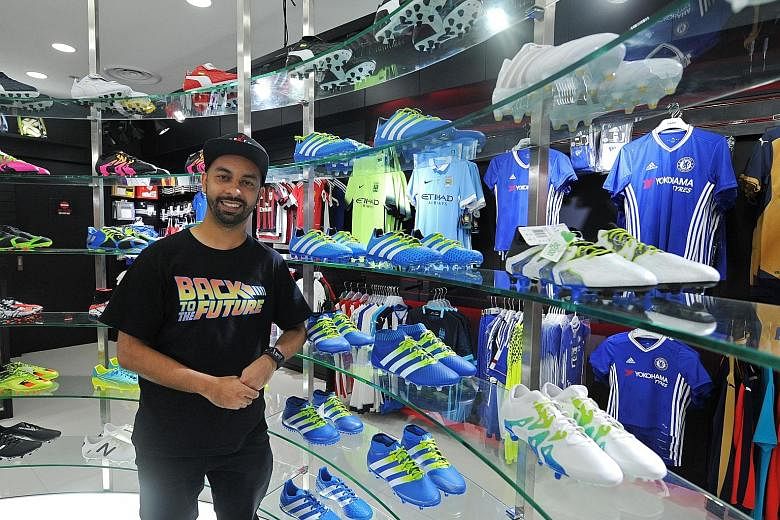Amandeep Singh shoots anxious glances in this reporter's direction throughout the 50-minute interview, though it has nothing to do with the flight to Bangkok he is running late for.
Instead, the co-owner of Weston Corporation is studying the steady stream of shoppers, mostly school children, entering the sports merchandise company's latest store at Tampines Mall.
Barely three weeks old, it features a floor-to-ceiling display panel with the latest football boots arranged neatly. Like Weston's other five outlets islandwide, it is stocked with everything a football fan could want.
Said Amandeep, 37: "It's very important to know what our customers, especially kids, are interested in. That's how we stay relevant and maintain our edge in this market."
The father of one handles most of Weston's social media engagements himself. It has close to half a million Facebook followers across South-east Asia and its recently active Instagram account has quickly swelled to 30,000 followers.
The one-day sale Weston organised and promoted online last year saw three-hour queues to enter its Kallang Wave Mall branch.
All this has kept Weston, synonymous for decades to Singaporeans thanks to its extensive range of football products and competitive prices, successful in an era where e-commerce has become commonplace.
The family business was founded by Amandeep's grandfather in 1950 and began as a general sporting goods shop in Bras Basah.
Amandeep, his brother Mandeep, 40, and their cousin Rajbir, 32, are the latest generation and the trio handle the bulk of the operations now and oversee about 100 full-time staff.
Despite the flagging domestic retail scene - discounting motor vehicles, retailers' takings dropped by 9.6 per cent in February compared to 12 months ago - Weston, with its niche clientele, continued to do brisk business in 2015.
Weston declined to reveal last year's revenues but it is understood that it sold about 150,000 replica jerseys and boots during that period.
Yet this is unsurprising considering that the global sports merchandise business is worth US$310 billion (S$425 billion), according to a 2014 study by consulting firm A.T. Kearney.
Football, and the English Premier League in particular, is also highly lucrative. A 2015 report by EY - the accounting giant formerly known as Ernst & Young - estimated that the total commercial and retail output by the 20 clubs during the 2013-14 EPL season was £910 million (S$1.8 billion).
It explains why retailers like Weston, despite having to pre-book its orders six months in advance, are pulling out all the stops to attract new shoppers.
The arrival of French sporting goods retail giant Decathlon, which in January set up a 35,000 sq ft flagship store at Viva Business Park, formerly known as Chai Chee Technopark, will also provide competition.
Evolution is key, said Amandeep. "Whether it's making our stores more premium or engaging customers online, you have to try different things," he said.
It helps that Weston - which last year hosted meet-and-greet sessions for fans at its stores featuring players from visiting clubs Borussia Dortmund and Arsenal - is internationally recognised.
It is one of only five retailers (alongside soccer.com from the United States, Pro:Direct of Britain, Japan's Kamo Soccer Shop and Unisport from Scandinavia) with exclusive access to Puma products.
It has a similar arrangement with adidas.
"Product is key. That's the ammunition which sets us apart from everyone else in Singapore and South-east Asia," said Amandeep, who was invited and sent one of his staff to Liverpool to cover the club's 2016-17 kit launch on Monday.
Those items and the newest range from Manchester United and Chelsea are already available at Weston stores to cater to the 1.6 million EPL fans in Singapore, according to research conducted by the league.
Weston will also bring in jerseys of all 24 teams competing in June's European Championship.
Noted Amandeep: "If a customer walks into the store and says, 'How come Weston doesn't have the latest jerseys?', that's the moment we lose out. We cannot afford to let that happen."
Such enterprise extends to their pricing model. Unlike the pre-Internet era, there is nothing to stop a Singaporean from shopping online at Pro:Direct and "if he finds it cheaper he'll buy it from them and not us", noted Amandeep.
"We've got to be competitive, not just in Singapore but with the rest of the world."
While online sales currently comprise 3 to 4 per cent of its total sales, Weston is revamping its online store - it integrated PayPal as a payment option in 2012 - and is targeting to raise that figure to 15 per cent.
Amandeep has not ruled out venturing overseas, particularly across the Causeway.
He said: "Look at JDT (Malaysian Super League club Johor Darul Ta'zim). They regularly have 20,000-30,000 fans in their stadium and they are buying the original kits that go for RM200 (S$68).
"We brought in some and they sold out in a month. The potential in Malaysia is huge."


